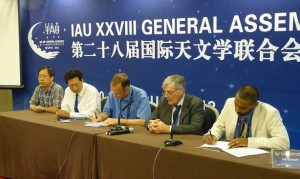East Asia
CLICK HERE TO VISIT THE EAST ASIA REGIONAL NODE AND CHINESE LANGUAGE EXPERTISE CENTRE WEBSITE
Download the first EA-ROAD/LOAD Newsletter here!
East Asian Regional node (ROAD) based in China!
The International Astronomical Union (IAU) has signed a landmark agreement with a consortium of Chinese institutes that will see the establishment of a coordinating centre to use astronomy as a tool to stimulate development in the East Asian region. This agreement comes as part of the IAU’s decadal strategic plan which aims to realise the societal benefits of astronomy. The strategic plan was ratified by IAU members in 2009, at the last General Assembly. Since then a global coordinating Office of Astronomy for Development (OAD) was established in Cape Town, South Africa, and has led the implementation of this plan.
 Director of the OAD Kevin Govender comments on the signing of this East Asian agreement: “It is an essential part of the strategic plan to have regional coordination in place so as to ensure informed local participation in any IAU development activities. We really look forward to working closely with this group of institutions both to develop astronomy as a field and to use astronomy for development in the East Asian region.”
Director of the OAD Kevin Govender comments on the signing of this East Asian agreement: “It is an essential part of the strategic plan to have regional coordination in place so as to ensure informed local participation in any IAU development activities. We really look forward to working closely with this group of institutions both to develop astronomy as a field and to use astronomy for development in the East Asian region.”
The agreement covers two important functions that the node will serve. One is known as a Regional Node which entails the coordination of astronomy-for-development activities in countries within the general geographical region of East Asia. The other is known as a Language Expertise Centre which will deal with all aspects relating to (mainly) the Chinese language and culture. The impact of the latter may obviously spread well beyond the geographical region to other parts of the world.
The main institutes involved in the consortium are the Kavli Institute for Astronomy and Astrophysics (KIAA, Peking University), Beijing Planetarium and Yunnan Astronomical Observatory. The consortium is supported in their efforts by various important partners including the National Astronomical Observatories of the Chinese Academy of Sciences(NAOC), the East Asian Core Observatories Association (EACOA), and Pyongyang Astronomical Observatory (PAO).Richard de Grijs (KIAA), who has been leading the efforts on behalf of the consortium, says:
“We are pleased to have been selected by the IAU to carry out this important mission. We are well placed, along with our many partners, to implement a wide variety of activities in the region that will contribute to the strategic plan. I look forward to working with the IAU as we set out to use astronomy to make the world a better place.”
This agreement is the first of its kind to be signed anywhere in the world. It follows the IAU’s Announcement of Opportunity that went out in January 2012 which attracted 31 letters of intent and 15 full proposals (received from every populated continent) to establish similar coordinating nodes elsewhere.
 AW-ROAD Just another WordPress site
AW-ROAD Just another WordPress site
